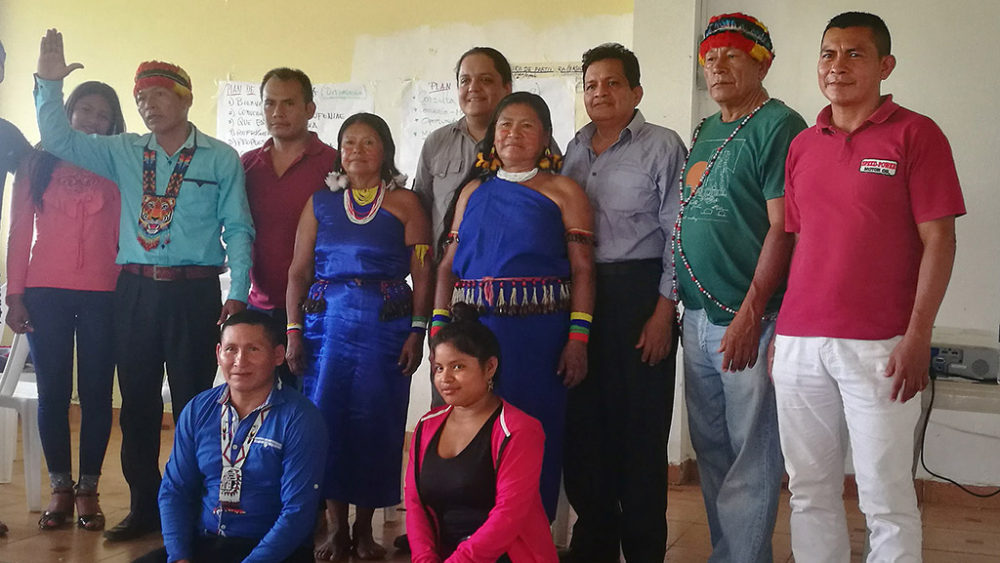The Shuar Yamanunka Commune is located in the Northern Amazon of Ecuador, Sucumbíos province, Shushufindi Canton, Limoncocha Parish; its area is 8,826.40 hectares and it has 1,661 inhabitants.
Yamanunka means new land; according to its inhabitants, it got this name because the founders came from Morona Santiago and Zamora Chinchipe Provinces in 1972.
The lack of planning has meant that the Shuar Commune had not identified its life aspirations as a community, nor where it wants to go; this is evidenced by the rental of land to third parties and consequent direct damage to its forest reserves.
In late 2019, Yamanunka leaders, CONFENIAE and the Comprehensive Amazon Program for Forest Conservation and Sustainable Production PROAmazonía technical team accompanied a process to update the Yamanunka Commune Life Plan, to address the main problems of the commune and its potentialities, in search of integral solutions. This took place in a participatory manner with the entire community, in accordance with the territory – culture – human relationship combined with other material and spiritual aspects.
A Life Plan is a planning tool for territorial development from the perspective of peoples and nationalities. It collects historical information from the memory of the elderly as a foundation for spirituality, respect for nature, sacred places in the forest and water sources, as well as changes the territory has undergone due to human impacts on flora, fauna and aquatic ecosystems as sources of food, and visualizes this in the current context to identify inequities, gaps and deficiencies that affect the population. Through the Life Plan, possible solutions are proposed to restore the natural habitat, achieve equity and equal treatment of all human settlements, in order to satisfy basic needs, hopes and desires with the support of the State.
In testimonies collected during the process, leaders of the Shuar Yamanunka Commune mentioned that the development of the Life Plan was an opportunity to remember the life history of their people, to remember where their parents and siblings came from to populate these lands and the struggle it was to have a comprehensive description of the area where they now live. They also noted: “The Life Plan will give us a guide, a path along which we must travel to recover our identity as people of the Shuar nationality; to take care of our land.”
Rosa Tsawad, leader of the women’s group of the commune, said: “We had a life plan for the entire Shuar nationality in Sucumbíos province, but not one that was only for us as Yamanunka that articulated our problems.”

Women leaders of the Shuar Yamanunka Commune, 2019

Yamanunka youth who conducted the surveys, 2019
On September 14 of this year, a working meeting was held with the leaders of the commune to review the pedagogical mediation document of the Life Plan that will be translated into the Shuar language; it contains relevant aspects of territorial development from the perspective of the community.
These include historical information from the memories of the elderly as the foundation of spirituality, respect for nature, sacred places in the forest, water sources as rivers of life; and changes the territory has undergone due to the human impact on flora, fauna and aquatic ecosystems.
It also identified inequities, gaps and deficiencies that affect the population, for which possible solutions were proposed for restoring the natural habitat, achieving equity and ensuring equal treatment of all human settlements to satisfy their basic needs, hopes and desires with the support of the State.
The Life Plan contains 16 projects; through these, solutions will be found for the main problems, such as the loss of cultural expressions, forest degradation, socio-organizational weakness, etc..
PROAmazonía’s commitment is to continue supporting Yamanunka in implementing actions and projects to meet the objectives of the Life Plan, which is aligned with climate change, sustainable production, interculturality and gender criteria.
Author: Margoth Elizalde- Territorial Platforms of the Northern Amazon of Ecuador- PROAmazonía
 Español
Español English
English
